John Hurrell – 19 February, 2021
To these 780 x 570 mm sheets O'Connor has added his own characteristic graphite drawings of rebus-like symbolic objects and creatures, and a reading child. The resulting works make up the bulk of his 'Double Kiss' show upstairs at Two Rooms. Some of the Gare St Lazare Ireland productions promoted in the posters are based on short pieces of prose, others plays, a few, novels. One work examines Beckett's career overall, another incorporates music with his language, and for something else quite different, one even uses Herman Melville's novel 'Moby Dick.'
This exhibition is a two-time tip of the hat (twice, a ‘double kiss’) from Denis O’Connor firstly to Samuel Beckett and then to the drama company Gare St Lazare Ireland, wonderful performers of Beckett’s plays.
Blessedly, these players (named after the railway station in Paris) have been to Auckland. I was lucky enough to see them (Connor Lovett, actor, and Judy Hegarty-Lovett, director) perform a staged version of Beckett’s short story, The End, in the Herald Theatre (Aotea Centre) during the Auckland Arts Festival of March 2011. (They also did First Love—see the poster images—in alternating performances.) Like O’Connor this troupe is passionate about Irish culture, and so it is natural that they became friends and ended up giving O’Connor a mint set of posters promoting their productions. These form the base of this show.
To these 780 x 570 mm sheets O’Connor has added his own characteristic graphite drawings of rebus-like symbolic objects and creatures, and a reading child. The resulting works make up the bulk of his Double Kiss show upstairs at Two Rooms. Some of the GSLI productions promoted in the posters are based on short pieces of prose, others plays, a few, novels. One work examines Beckett’s career overall, another incorporates music with his language, and for something else quite different, one even uses Herman Melville’s novel Moby Dick.
O’Connor’s Double Kiss title is a clever reference to the game of snooker when the propelled white cue ball coincidentally hits the targeted (object) ball twice. Appropriately, a large work in this show (UA: the aitche in hope, the surd in absurd, 1995) is a piece of grey slate set inside a small (half-sized) billiard table. It presents the engraved letters (A, H, b, U, d) and a mysterious image of a piggybacked child looking at a distant landscape, carved in low relief. The child seems to be a metaphor for the art viewer standing in the gallery. The piece is like a visual riddle, with the billiard table depicting itself with a reflexivity often apparent in Beckett’s writing.
Another much smaller slate work (Face to Face, 1999) references the novel Molloy, and shows a portrait of Beckett himself, his handsome grizzly visage staring forth, as if carved from granite. A lot of artists admire him for his bleak humour, hypnotic language, controlled cadences, inventive solipsistic interiority and hauntingly grim nihilism. In tribute, Jasper Johns made a series of etchings in the mid-seventies based on his Fizzles, the word for little silent farts; and one of the best covers Bookforum ever had was (ten years ago) a shot of bony-legged Beckett—who was normally a recluse—striding off to the beach in Tangier with skimpy shorts, tote bag, sunglasses and sandals.
Nevertheless, I’m not sure about how much Beckett you can absorb directly from Double Kiss, apart from the passion for his work exuded by O’Connor and the Gare St Lazare players. Best see his plays and read his books for that.
Beckett is an extraordinarily complicated writer in that he is promoted as an Irishman who was a virtuoso master of the English language, yet he lived in Paris, created his texts in French, and these he then translated into English. Also fluid in terms of identity, it is fitting that this show blends his writings of a Parisian with the theatre productions of a group based in Cork and the artwork of a empathetic Waiheke-dwelling Aucklander. What delicious complexity!
John Hurrell
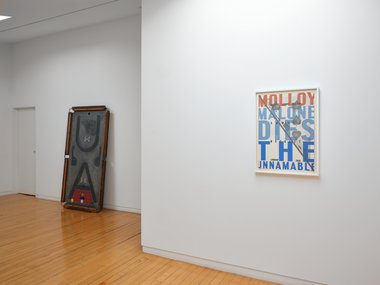



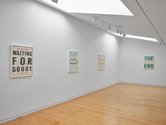






 Advertising in this column
Advertising in this column Two Rooms presents a program of residencies and projects
Two Rooms presents a program of residencies and projects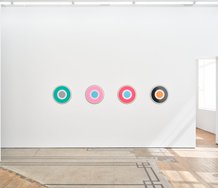
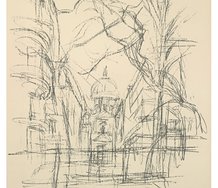
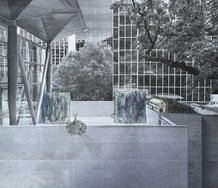
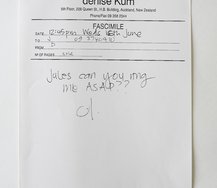
This Discussion has 0 comments.
Comment
Participate
Register to Participate.
Sign in
Sign in to an existing account.